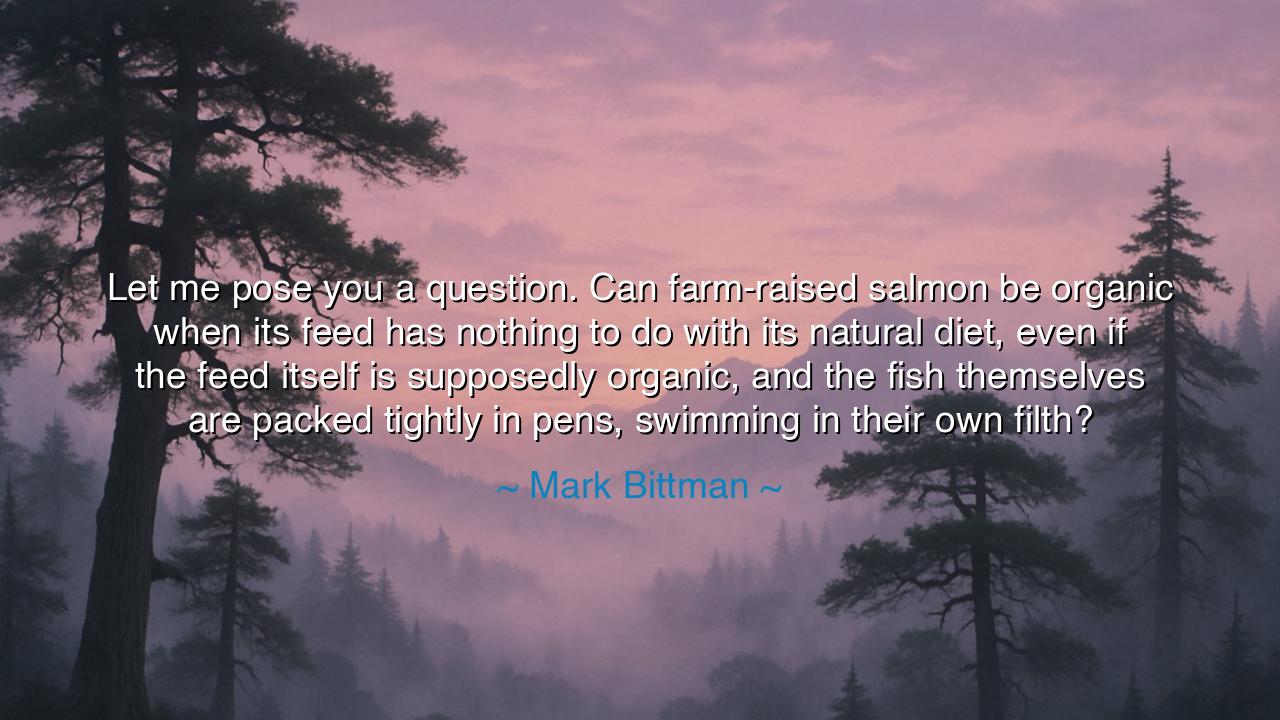
Let me pose you a question. Can farm-raised salmon be organic
Let me pose you a question. Can farm-raised salmon be organic when its feed has nothing to do with its natural diet, even if the feed itself is supposedly organic, and the fish themselves are packed tightly in pens, swimming in their own filth?






In the searing and contemplative words of Mark Bittman, we encounter not a simple question of fish or food, but a challenge to the very heart of human integrity: “Let me pose you a question. Can farm-raised salmon be organic when its feed has nothing to do with its natural diet, even if the feed itself is supposedly organic, and the fish themselves are packed tightly in pens, swimming in their own filth?” This is no idle inquiry—it is a moral summons, a call to awaken from complacency. Beneath his words lies an ancient tension between appearance and truth, between what is declared pure and what is truly so. For though the label may read “organic,” Bittman reminds us that words without wisdom, and systems without ethics, lead only to decay of both nature and conscience.
To speak of “organic” is to invoke purity—the harmony between creature and earth, between life and its rightful sustenance. Yet, Bittman exposes how this word, once sacred, has been corrupted by convenience and commerce. The salmon, once the symbol of strength and freedom, now becomes a prisoner of our industry, its body confined, its diet unnatural, its waters tainted. What was wild and radiant becomes a shadow of itself—a creature that lives, but does not thrive. In this, he mirrors a greater truth: that when mankind distorts nature to fit his profit, he also distorts himself. For the health of the earth and the health of man are bound together, and to poison one is to weaken the other.
The ancients would have understood this deeply. The philosopher Heraclitus, who taught that all things flow, would have seen in the caged salmon a violation of the world’s natural rhythm. “You cannot step into the same river twice,” he said, meaning that nature lives in motion and change. But the fish farms, where countless creatures circle endlessly in stagnant waters, mock this eternal law. They are the rivers that no longer flow, the cycle of life broken by artificial walls. Bittman’s question, then, is not merely about the ethics of aquaculture—it is about the loss of balance, the forgetting of the sacred bond between humanity and the living world.
Consider the parable of King Midas, who in his greed wished that all he touched would turn to gold. His wish was granted, but the result was horror: his food turned to metal, his daughter to statue, his joy to ruin. The modern world, too, suffers from this curse of transformation. We have learned to turn life into commodity—to make the wild efficient, the fertile predictable, the organic mechanical. The farm-raised salmon, trapped and overfed, is our golden fish: profitable, yet lifeless. Bittman’s question pierces through the gleam of that false gold and asks, as Midas once learned too late: What is the worth of abundance if it costs us the soul of nature?
There is also in his words a deeper reflection on truth and deceit. The term “organic” is meant to inspire trust—it speaks to purity, to care, to respect for the natural order. Yet, when used to describe creatures fed on unnatural diets, confined and sickened by their own waste, it becomes a lie gilded in moral paint. The ancient Stoics, lovers of reason and integrity, would have called this hypocrisy—a breaking of the harmony between word and action. For the Stoic held that virtue lies not in how one appears, but in how one lives. So too must we, in our treatment of the earth, ensure that our deeds match our declarations. To call the polluted “pure” is not only false—it is a betrayal of the sacred duty we owe to life itself.
The lesson, then, is both ethical and spiritual: that we must seek alignment with nature, not domination over it. If we wish to eat in health, we must first learn to live in honesty. The salmon, the soil, the seed—these are not ours to manipulate at will, but to tend with reverence. True nourishment cannot come from deception; true health cannot grow from cruelty. To consume with awareness is to honor the circle of life, but to consume blindly is to break it. The body may survive for a while on such spoils, but the spirit—like the salmon confined to its pen—will slowly suffocate.
Therefore, let us take Bittman’s question not as criticism, but as invitation. Let us return to the wisdom of balance—to eat from the earth as our ancestors once did, not as conquerors, but as kin. Choose food that is alive, not merely labeled so. Support those who farm with care, who let rivers flow and creatures feed as they were meant to. And remember: every act of consumption is also an act of creation, shaping the world that will feed our children.
In the end, Bittman’s words call us back to truth—to see beyond the illusion of “organic” and to restore its sacred meaning. For purity cannot be manufactured, nor health faked. The salmon, the soil, the seed—all whisper the same ancient message: “Live in harmony with nature, or perish in defiance of it.” The wise will listen, not only with their ears, but with their hearts. For only when we honor what is real will we be nourished in body, mind, and soul.






AAdministratorAdministrator
Welcome, honored guests. Please leave a comment, we will respond soon